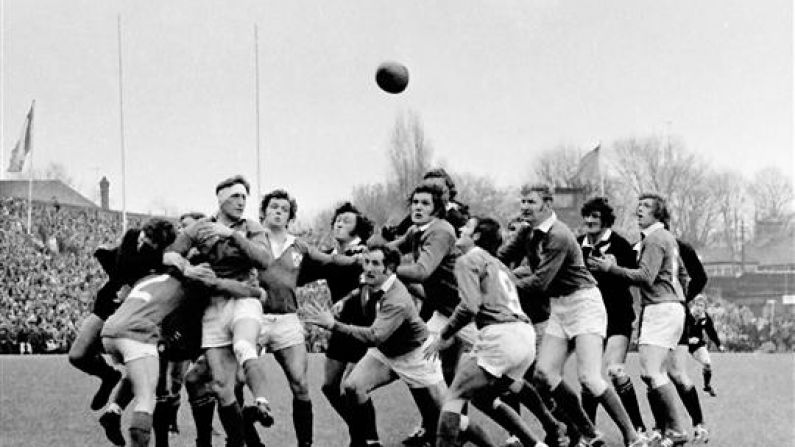The Ireland-New Zealand game of 1973. The only time Ireland played New Zealand without losing. Had Barry McGann converted Tom Grace's late try in the corner, we'd have won.
By its own standards, Irish rugby was rude health in the early 1970s. We were in the middle of a five game winning streak against England and were probably the second best side in the Northern Hemisphere after Wales.
The previous year had brought agonising disappointment. For the first time in yonks, Ireland had won in both Twickenham and Paris. With Wales coming to Dublin, it appeared that a Grand Slam was a serious possibility.
Except that neither Wales nor Scotland were coming to Dublin. Despite assurances from the IRA themselves that their players would come to no harm in Dublin, the Welsh and the Scots stayed away.
The following year, England came to Lansdowne Road and lost 18-9. The English team received a thunderous ovation from the grateful home crowd. John Pullin's line about being no good but turning up remains one of the most heavily quoted in rugby history.
But only a month earlier, the New Zealanders had landed in Lansdowne Road and played despite receiving a slightly disquieting letter allegedly from representatives of the Official IRA.
We now must dip into a brief and sketchy history lesson this. The split of 1970 had divided the IRA into two camps, the Official IRA and the Provisional IRA. The provos were determined to wage war in Northern Ireland to get rid of the British presence. The Official IRA were moving in a more Marxist direction and asserted that the campaign of the provisionals was sectarian in nature.
The Official IRA would quickly become the force in Irish life most hostile to the Provos' campaign. The most recent split is always the most bitter. Many of the surviving members of 'Official Sinn Fein' now find themselves in the Labour Party.
The Officials declared ceasefire in 1972. They wrote to New Zealand fly half Bob Burgess before the team arrived in Dublin. They assured Burgess that OIRA would "take steps to ensure your safety but we do not trust the Provos (our Black September group)".
"It is unlikely that any of your members would be treated as hostages, although you play a foreign game and we know that many of have close Ulster associations," the letter wrote. "No such immunity can be extended to any British team, and we assure you that it was with good reason that the Scots and the Welsh did not come here".
The letter, which bears the supposed signatures of Mairin De Burca and Tony Heffernan, was reproduced in full by Tom English in his superb history of Irish rugby 'No Borders'.
England defied IRA and came to Ireland to play in 1973, but New Zealand did it first. Irish rugby owes them a debt pic.twitter.com/W1jvHMPlXf
— Tom English (@BBCTomEnglish) October 27, 2016
It is to the New Zealanders' credit that, after reading the most non-reassuring letter of reassurance in the whole of history of letters, they still decided to come here anyway.
However, one of the alleged signatories of this letter is now claiming that the Official IRA sent no letter to Burgess. In the updated version of No Borders, Heffernan even suggested to Tom English that the letter might have been composed by Loyalist groups intent on stopping the All Blacks travelling to Dublin.
Though, this is only one possible theory.










